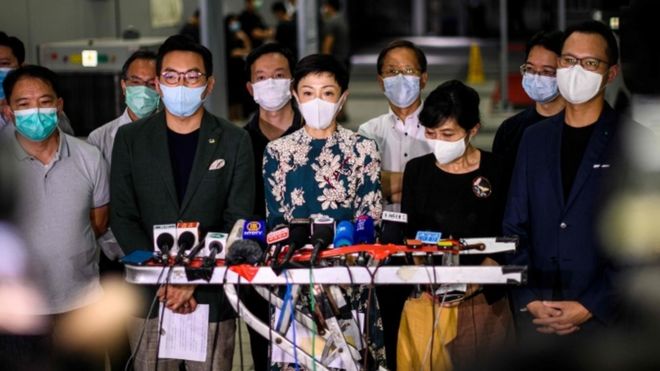
AFP Image Tanya Chan (C) said this was "the saddest day in Hong Kong history"
Pro-democracy activists say they fear "the end of Hong Kong", after China announced plans for a new security law.
The US said the move could be "highly destabilising" and undermine China's obligations on Hong Kong's autonomy.
China's National People's Congress will on Friday debate the law, aimed at banning sedition and subversion.
Supporters say it is needed to tackle the violence in political protests that erupted last year. Opponents fear it will be used to remove basic freedoms.
Hong Kong has observed a "one country, two systems" policy and a "high degree of autonomy" since Britain returned sovereignty to China in 1997.
But activists, and the pro-democracy movement, feel that this is being undermined by Beijing.
Why are there protests in Hong Kong? All the context you need
Last year, millions took to the streets over seven months to protest against a bill that would have allowed extraditions to mainland China. Many of the protests turned violent. The bill was eventually paused, and then withdrawn.
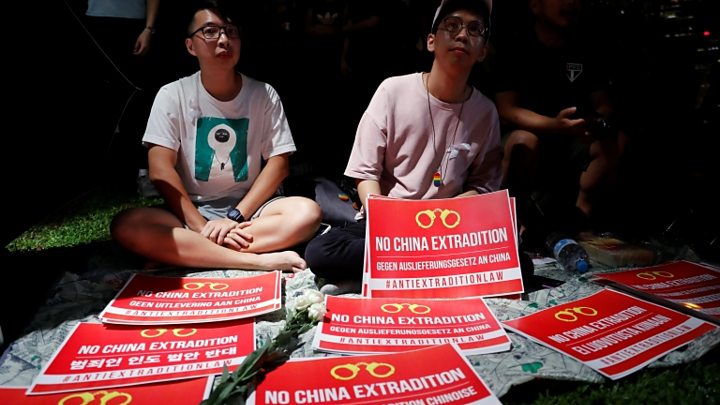
The BBC's Helier Cheung on Hong Kong's 2019 protests
The security law is more controversial still. According to the Basic Law, the territory's mini-constitution, Hong Kong's government is required to pass national security legislation. However, an attempt in 2003 failed after 500,000 people took to the streets in opposition.
That is why an attempt now to force through national security legislation - which one legislator on Thursday called "the most controversial [issue] in Hong Kong since the handover" - has caused such outrage.
The BBC's China correspondent, Robin Brant, says that what makes the situation so incendiary is that Beijing can simply bypass Hong Kong's elected legislators and impose the changes.
China can place them into Annex III of the Basic Law, which covers national laws that must then be implemented in Hong Kong - either by legislation, or decree.
Pro-democracy activists fear the law will be used to muzzle protests in defiance of the freedoms enshrined in the Basic Law, as similar laws in China are used to silence opposition to the Communist Party.
What have opponents of China's move said?
A number of pro-democracy figures in Hong Kong, including Democratic Party leader Wu Chi-wai, said the announcement was the death of "one country, two systems".
Civic Party lawmaker Dennis Kwok said "if this move takes place, 'one country, two systems' will be officially erased. This is the end of Hong Kong."
His colleague Tanya Chan added that this was the "saddest day in Hong Kong history".
Student activist and politician Joshua Wong tweeted that the move was an attempt by Beijing to "silence Hong Kongers' critical voices with force and fear".
Meanwhile, the US state department said that "any effort to impose national security legislation that does not reflect the will of the people of Hong Kong would be highly destabilising, and would be met with strong condemnation".
President Donald Trump said the US would react strongly if China followed through with its proposals, without giving details.
The US is currently considering whether to extend Hong Kong's preferential trading and investment privileges. It must decide by the end of the month.
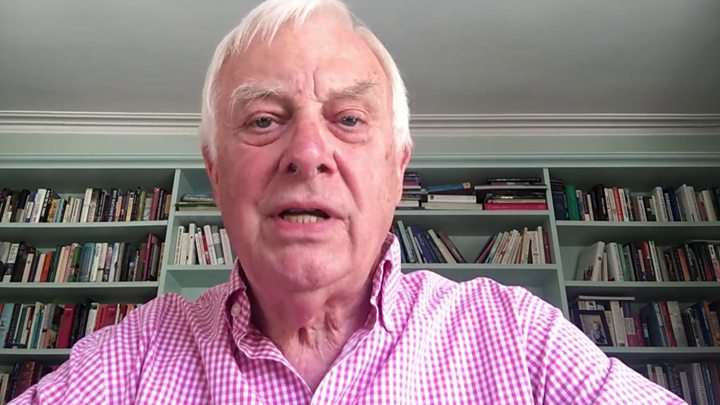
Former Hong Kong governor Chris Patten: "UK should tell China this is outrageous"
The last British governor of Hong Kong, Chris Patten, called the move a "comprehensive assault on the city's autonomy".
A spokesperson for the British Foreign Office said that the UK expected China "to respect Hong Kong's rights and freedoms and high degree of autonomy".
What is China's position?
Sources at the National People's Congress (NPC) have said that Beijing can no longer wait for Hong Kong to pass its own law, nor can it continue to watch the growth of what it sees as a violent anti-government movement.
One source told the South China Morning Post: "We can no longer allow acts like desecrating national flags or defacing of the national emblem in Hong Kong."
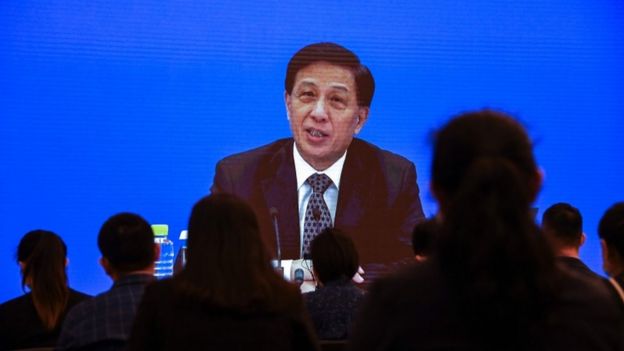
The security law is more controversial still. According to the Basic Law, the territory's mini-constitution, Hong Kong's government is required to pass national security legislation. However, an attempt in 2003 failed after 500,000 people took to the streets in opposition.
That is why an attempt now to force through national security legislation - which one legislator on Thursday called "the most controversial [issue] in Hong Kong since the handover" - has caused such outrage.
The BBC's China correspondent, Robin Brant, says that what makes the situation so incendiary is that Beijing can simply bypass Hong Kong's elected legislators and impose the changes.
China can place them into Annex III of the Basic Law, which covers national laws that must then be implemented in Hong Kong - either by legislation, or decree.
Pro-democracy activists fear the law will be used to muzzle protests in defiance of the freedoms enshrined in the Basic Law, as similar laws in China are used to silence opposition to the Communist Party.
What have opponents of China's move said?
A number of pro-democracy figures in Hong Kong, including Democratic Party leader Wu Chi-wai, said the announcement was the death of "one country, two systems".
Civic Party lawmaker Dennis Kwok said "if this move takes place, 'one country, two systems' will be officially erased. This is the end of Hong Kong."
His colleague Tanya Chan added that this was the "saddest day in Hong Kong history".
Student activist and politician Joshua Wong tweeted that the move was an attempt by Beijing to "silence Hong Kongers' critical voices with force and fear".
Meanwhile, the US state department said that "any effort to impose national security legislation that does not reflect the will of the people of Hong Kong would be highly destabilising, and would be met with strong condemnation".
President Donald Trump said the US would react strongly if China followed through with its proposals, without giving details.
The US is currently considering whether to extend Hong Kong's preferential trading and investment privileges. It must decide by the end of the month.

Former Hong Kong governor Chris Patten: "UK should tell China this is outrageous"
The last British governor of Hong Kong, Chris Patten, called the move a "comprehensive assault on the city's autonomy".
A spokesperson for the British Foreign Office said that the UK expected China "to respect Hong Kong's rights and freedoms and high degree of autonomy".
What is China's position?
Sources at the National People's Congress (NPC) have said that Beijing can no longer wait for Hong Kong to pass its own law, nor can it continue to watch the growth of what it sees as a violent anti-government movement.
One source told the South China Morning Post: "We can no longer allow acts like desecrating national flags or defacing of the national emblem in Hong Kong."

AFP Image Zhang Yesui announces the move ahead of the opening of the NPC
Beijing may also fear September's elections to Hong Kong's legislature. If last year's success for pro-democracy parties in district elections is repeated, government bills could potentially be blocked.
Announcing the move on Thursday, spokesman Zhang Yesui gave little away, saying the measure would "improve" on one country, two systems.
Mr Zhang said: "National security is the bedrock underpinning the stability of the country. Safeguarding national security serves the fundamental interest of all Chinese, our Hong Kong compatriots included."
Beijing may also fear September's elections to Hong Kong's legislature. If last year's success for pro-democracy parties in district elections is repeated, government bills could potentially be blocked.
Announcing the move on Thursday, spokesman Zhang Yesui gave little away, saying the measure would "improve" on one country, two systems.
Mr Zhang said: "National security is the bedrock underpinning the stability of the country. Safeguarding national security serves the fundamental interest of all Chinese, our Hong Kong compatriots included."
Hong Kong's year in seven intense emotions
After debating the issue, the NPC - generally a rubber stamp - will vote on it next week. The matter would then not advance until June, when it goes before the Standing Committee.
An editorial in the state-run China Daily said the law meant that "those who challenge national security will necessarily be held accountable for their behaviour".
In Hong Kong, the pro-Beijing DAB party said it "fully supported" the proposals, which were made "in response to Hong Kong's rapidly worsening political situation in recent years".
Pro-Beijing lawmaker Christopher Cheung told Reuters: "Legislation is necessary and the sooner the better."
What is Hong Kong's legal situation?
Hong Kong was ruled by Britain as a colony for more than 150 years up to 1997.
The British and Chinese governments signed a treaty - the Sino-British Joint Declaration - that agreed Hong Kong would have "a high degree of autonomy, except in foreign and defence affairs", for 50 years.
This was enshrined in the Basic Law, which runs out in 2047.
As a result, Hong Kong's own legal system, borders, and rights - including freedom of assembly and free speech - are protected.
But Beijing has the ability to veto any changes to the political system and has, for example, ruled out direct election of the chief executive.
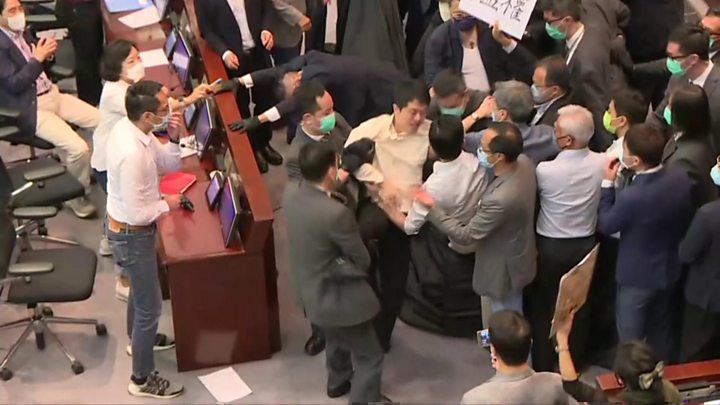
Uproar on Monday in Hong Kong's legislature
Hong Kong saw widespread political protests in 2019 but these became much smaller during the coronavirus outbreak.
However, there were chaotic scenes in Hong Kong's legislative chamber on Monday, when a number of pro-democracy lawmakers were dragged out during a row about a bill that would make it illegal to disrespect the national anthem.
A group of 15 prominent pro-democracy activists also appeared in court on Monday charged with organising and taking part in unlawful assemblies related to last year's protests.
USING COVID-19 TO CRACK DOWN ON PROTESTERS
China parliament eyes Hong Kong national security law after unrest

AFP / Anthony WALLACE
Beijing has made clear it wants new security legislation passed after Hong Kong was rocked by massive and sometimes violent pro-democracy protests last year
China's parliament said Thursday it will introduce a proposal for a national security law in Hong Kong at its annual session, in a move likely to stoke unrest in the financial hub.
Beijing has made clear it wants new security legislation passed after the semi-autonomous city was rocked by seven months of massive and sometimes violent pro-democracy protests last year.
The proposal will be introduced on Friday, the first day of the National People's Congress, and would strengthen "enforcement mechanisms" in the financial hub, the parliament's spokesman Zhang Yesui said.
China's parliament considers it "necessary to improve and uphold the 'One Country, Two Systems' policy," Zhang said, referring to the arrangement that has underpinned the city's liberties and free market economy.
Article 23 of Hong Kong's mini-constitution, the Basic Law, says the city must enact national security laws to prohibit "treason, secession, sedition (and) subversion" against the Chinese government.
ut the clause has never been implemented due to deeply held public fears it would curtail Hong Kong's widely cherished civil rights.

China's parliament said Thursday it will introduce a proposal for a national security law in Hong Kong at its annual session, in a move likely to stoke unrest in the financial hub.
Beijing has made clear it wants new security legislation passed after the semi-autonomous city was rocked by seven months of massive and sometimes violent pro-democracy protests last year.
The proposal will be introduced on Friday, the first day of the National People's Congress, and would strengthen "enforcement mechanisms" in the financial hub, the parliament's spokesman Zhang Yesui said.
China's parliament considers it "necessary to improve and uphold the 'One Country, Two Systems' policy," Zhang said, referring to the arrangement that has underpinned the city's liberties and free market economy.
Article 23 of Hong Kong's mini-constitution, the Basic Law, says the city must enact national security laws to prohibit "treason, secession, sedition (and) subversion" against the Chinese government.
ut the clause has never been implemented due to deeply held public fears it would curtail Hong Kong's widely cherished civil rights.

AFP / LEO RAMIREZ
Zhang Yesui said China's parliament considered the move necessary
The city enjoys freedoms unseen on the Chinese mainland which are protected by an agreement made before former Britain handed the territory back to Beijing in 1997.
An attempt to enact Article 23 in 2003 was shelved after half a million people took to the streets in protest.
The controversial bill has been put back on the table in recent years in response to the rise of the city's pro-democracy movement.
Zhang did not provide more details about the proposed law.
But if it is introduced to the NPC it is likely to be approved, as the body rubber-stamps decisions already made by Communist Party policymakers.
- 'End of Hong Kong' -
Hong Kong's largest pro-Beijing political party DAB was quick to voice its support for the proposal, describing it as a "responsible move".

The city enjoys freedoms unseen on the Chinese mainland which are protected by an agreement made before former Britain handed the territory back to Beijing in 1997.
An attempt to enact Article 23 in 2003 was shelved after half a million people took to the streets in protest.
The controversial bill has been put back on the table in recent years in response to the rise of the city's pro-democracy movement.
Zhang did not provide more details about the proposed law.
But if it is introduced to the NPC it is likely to be approved, as the body rubber-stamps decisions already made by Communist Party policymakers.
- 'End of Hong Kong' -
Hong Kong's largest pro-Beijing political party DAB was quick to voice its support for the proposal, describing it as a "responsible move".

AFP / Anthony WALLACE
The controversial bill has been put back on the table in recent years in response to the rise of the city's pro-democracy movement
But pro-democracy lawmakers in Hong Kong were furious.
"This is the end of Hong Kong, this is the end of One Country, Two Systems, make no mistake about it," Civic Party lawmaker Dennis Kwok told reporters.
Pro-democracy lawmaker Tanya Chan said Beijing had "shown zero respect for Hong Kong people" by attempting to enact the law without consultation.
"Many Hong Kongers must be as angry as us now, but we must remember not to give up," she added.
Chris Patten, Hong Kong's final British governor before the 1997 handover, said the proposal signalled a "comprehensive assault on the city's autonomy".
"This will be hugely damaging to Hong Kong's international reputation and to the prosperity of a great city," Patten said.

But pro-democracy lawmakers in Hong Kong were furious.
"This is the end of Hong Kong, this is the end of One Country, Two Systems, make no mistake about it," Civic Party lawmaker Dennis Kwok told reporters.
Pro-democracy lawmaker Tanya Chan said Beijing had "shown zero respect for Hong Kong people" by attempting to enact the law without consultation.
"Many Hong Kongers must be as angry as us now, but we must remember not to give up," she added.
Chris Patten, Hong Kong's final British governor before the 1997 handover, said the proposal signalled a "comprehensive assault on the city's autonomy".
"This will be hugely damaging to Hong Kong's international reputation and to the prosperity of a great city," Patten said.

AFP / Anthony WALLACE
Pro-democracy lawmaker Tanya Chan (C) said Beijing had "shown zero respect for Hong Kong people"
Hong Kong has its own lawmaking body, but at least two Hong Kong deputies to the NPC have openly said they would propose the idea of introducing the national security law without going through city's legislature.
Article 18 of Hong Kong's basic law allows the NPC to add legislation to an annex of the mini-constitution after consultations with a Basic Law committee and the Beijing-backed Hong Kong government.
The legislation can then be applied to Hong Kong without being scrutinised by the city's lawmakers.
The NPC's move comes after Beijing appointed a hardline senior official, known for a crackdown on Christians in mainland China, as its main policymaker for Hong Kong.
Xia Baolong, previously secretary-general at the national committee of China's top political advisory body, was promoted to director of the Hong Kong and Macau Affairs Office of the State Council in February.
China set to impose new Hong Kong security law, Trump warns of strong U.S. reaction
James Pomfret, Yew Lun Tian, Steve Holland
MAY 21, 2020
HONG KONG/BEIJING/WASHINGTON (Reuters) - China is set to impose new national security legislation on Hong Kong after last year’s pro-democracy unrest, a Chinese official said on Thursday, drawing a warning from President Donald Trump that Washington would react “very strongly” against the attempt to gain more control over the former British colony.
The U.S. State Department also warned China, saying a high-degree of autonomy and respect for human rights were key to preserving the territory’s special status in U.S. law, which has helped it maintain its position as a world financial centre.
China’s action could spark fresh protests in Hong Kong, which enjoys many freedoms not allowed on the mainland, after often violent demonstrations of 2019 plunged the city into its deepest turmoil since it returned to Beijing’s rule in 1997.
RELATED COVERAGE
U.S. senators seek to sanction Chinese over Hong Kong
U.S. State Department warns China over new Hong Kong security law
Trump, who has ratcheted up his anti-China rhetoric as he seeks re-election in November, told reporters “nobody knows yet” the details of China’s plan. “If it happens we’ll address that issue very strongly,” he said, without elaborating.
Zhang Yesui, spokesman for the China’s National People’s Congress, said details of the legislation would be given on Friday when the parliament holds its annual session.
“In light of the new circumstances and need, the National People’s Congress (NPC) is exercising its constitutional power” to establish a new legal framework and enforcement mechanism to safeguard national security in Hong Kong, he told a briefing.
Pro-democracy demonstrators have for years opposed the idea of national security laws, arguing they could erode the city’s high degree of autonomy, guaranteed under the “one country, two systems” formula in place for two decades.
A senior Hong Kong government official said details on the move and its implementation remained unclear, but Hong Kong media have reported the legislation would ban secession, foreign interference, terrorism and all seditious activities aimed at toppling the central government.
The “Hong Kong Human Rights and Democracy Act” approved by Trump last year requires the State Department to certify at least annually that Hong Kong retains enough autonomy to justify favourable U.S. trading terms.
U.S. Secretary of State Mike Pompeo said on May 6 he was delaying this assessment to account for any NPC actions.

FILE PHOTO: Demonstrators protesting the proposed extradition bill aim their flashlights towards riot police as they are chased through the streets of Hong Kong, China, August 25, 2019. REUTERS/Willy Kurniawan/File Photo
If the State Department decertified the territory, it would still ultimately fall to Trump whether to decide to end some, all, or none of the privileges Hong Kong currently enjoys.
Ending Hong Kong’s special status would be a big blow for U.S. firms. According to the State Department, 85,000 U.S. citizens lived in Hong Kong in 2018 and more than 1,300 U.S. companies operate there, including nearly every major U.S. financial firm.
State Department spokeswoman Morgan Ortagus said any move to impose legislation that did not reflect the will of the people would be highly destabilising and met with strong U.S. condemnation.
A previous attempt to introduce Hong Kong national security legislation, known as Article 23, in 2003 was met with mass peaceful protests and shelved.
Online posts had urged people in Hong Kong to protest on Thursday night and dozens were seen shouting pro-democracy slogans in a shopping mall as riot police stood nearby.
Opposition democrats said the move would gravely wound Hong Kong’s reputation as a financial centre and its autonomy.
“If this move takes place, ‘one country, two systems’ will be officially erased,” said democratic lawmaker Dennis Kwok.
“This is the end of Hong Kong.”
Daniel Russel, the top U.S. diplomat for Asia until early in the Trump administration, suggested Chinese President Xi Jinping might see “muscle-flexing” on Hong Kong as a means to make up for a series of setbacks, most notably the coronavirus pandemic that began in China - and this, despite the risk of severe economic consequences for Hong Kong, China and others.
U.S.-China tensions have heightened significantly in recent weeks, as they exchanged accusations on the handling of the pandemic, souring an already worsening relationship over trade.
Additional reporting by Greg Torode, Clare Jim, Sarah Wu, Jessie Pang, Steve Holland, David Brunnstrom and Humeyra Pamuk; Writing by Marius Zaharia, Alistair Bell and David Brunnstrom; Editing by Toby Chopra, Nick Macfie and Howard Goller
SEE https://plawiuk.blogspot.com/2020/05/hong-kong-crisis-china-presents.html
Hong Kong has its own lawmaking body, but at least two Hong Kong deputies to the NPC have openly said they would propose the idea of introducing the national security law without going through city's legislature.
Article 18 of Hong Kong's basic law allows the NPC to add legislation to an annex of the mini-constitution after consultations with a Basic Law committee and the Beijing-backed Hong Kong government.
The legislation can then be applied to Hong Kong without being scrutinised by the city's lawmakers.
The NPC's move comes after Beijing appointed a hardline senior official, known for a crackdown on Christians in mainland China, as its main policymaker for Hong Kong.
Xia Baolong, previously secretary-general at the national committee of China's top political advisory body, was promoted to director of the Hong Kong and Macau Affairs Office of the State Council in February.
China set to impose new Hong Kong security law, Trump warns of strong U.S. reaction
James Pomfret, Yew Lun Tian, Steve Holland
MAY 21, 2020
HONG KONG/BEIJING/WASHINGTON (Reuters) - China is set to impose new national security legislation on Hong Kong after last year’s pro-democracy unrest, a Chinese official said on Thursday, drawing a warning from President Donald Trump that Washington would react “very strongly” against the attempt to gain more control over the former British colony.
The U.S. State Department also warned China, saying a high-degree of autonomy and respect for human rights were key to preserving the territory’s special status in U.S. law, which has helped it maintain its position as a world financial centre.
China’s action could spark fresh protests in Hong Kong, which enjoys many freedoms not allowed on the mainland, after often violent demonstrations of 2019 plunged the city into its deepest turmoil since it returned to Beijing’s rule in 1997.
RELATED COVERAGE
U.S. senators seek to sanction Chinese over Hong Kong
U.S. State Department warns China over new Hong Kong security law
Trump, who has ratcheted up his anti-China rhetoric as he seeks re-election in November, told reporters “nobody knows yet” the details of China’s plan. “If it happens we’ll address that issue very strongly,” he said, without elaborating.
Zhang Yesui, spokesman for the China’s National People’s Congress, said details of the legislation would be given on Friday when the parliament holds its annual session.
“In light of the new circumstances and need, the National People’s Congress (NPC) is exercising its constitutional power” to establish a new legal framework and enforcement mechanism to safeguard national security in Hong Kong, he told a briefing.
Pro-democracy demonstrators have for years opposed the idea of national security laws, arguing they could erode the city’s high degree of autonomy, guaranteed under the “one country, two systems” formula in place for two decades.
A senior Hong Kong government official said details on the move and its implementation remained unclear, but Hong Kong media have reported the legislation would ban secession, foreign interference, terrorism and all seditious activities aimed at toppling the central government.
The “Hong Kong Human Rights and Democracy Act” approved by Trump last year requires the State Department to certify at least annually that Hong Kong retains enough autonomy to justify favourable U.S. trading terms.
U.S. Secretary of State Mike Pompeo said on May 6 he was delaying this assessment to account for any NPC actions.
FILE PHOTO: Demonstrators protesting the proposed extradition bill aim their flashlights towards riot police as they are chased through the streets of Hong Kong, China, August 25, 2019. REUTERS/Willy Kurniawan/File Photo
If the State Department decertified the territory, it would still ultimately fall to Trump whether to decide to end some, all, or none of the privileges Hong Kong currently enjoys.
Ending Hong Kong’s special status would be a big blow for U.S. firms. According to the State Department, 85,000 U.S. citizens lived in Hong Kong in 2018 and more than 1,300 U.S. companies operate there, including nearly every major U.S. financial firm.
State Department spokeswoman Morgan Ortagus said any move to impose legislation that did not reflect the will of the people would be highly destabilising and met with strong U.S. condemnation.
A previous attempt to introduce Hong Kong national security legislation, known as Article 23, in 2003 was met with mass peaceful protests and shelved.
Online posts had urged people in Hong Kong to protest on Thursday night and dozens were seen shouting pro-democracy slogans in a shopping mall as riot police stood nearby.
Opposition democrats said the move would gravely wound Hong Kong’s reputation as a financial centre and its autonomy.
“If this move takes place, ‘one country, two systems’ will be officially erased,” said democratic lawmaker Dennis Kwok.
“This is the end of Hong Kong.”
Daniel Russel, the top U.S. diplomat for Asia until early in the Trump administration, suggested Chinese President Xi Jinping might see “muscle-flexing” on Hong Kong as a means to make up for a series of setbacks, most notably the coronavirus pandemic that began in China - and this, despite the risk of severe economic consequences for Hong Kong, China and others.
U.S.-China tensions have heightened significantly in recent weeks, as they exchanged accusations on the handling of the pandemic, souring an already worsening relationship over trade.
Additional reporting by Greg Torode, Clare Jim, Sarah Wu, Jessie Pang, Steve Holland, David Brunnstrom and Humeyra Pamuk; Writing by Marius Zaharia, Alistair Bell and David Brunnstrom; Editing by Toby Chopra, Nick Macfie and Howard Goller
SEE https://plawiuk.blogspot.com/2020/05/hong-kong-crisis-china-presents.html
No comments:
Post a Comment